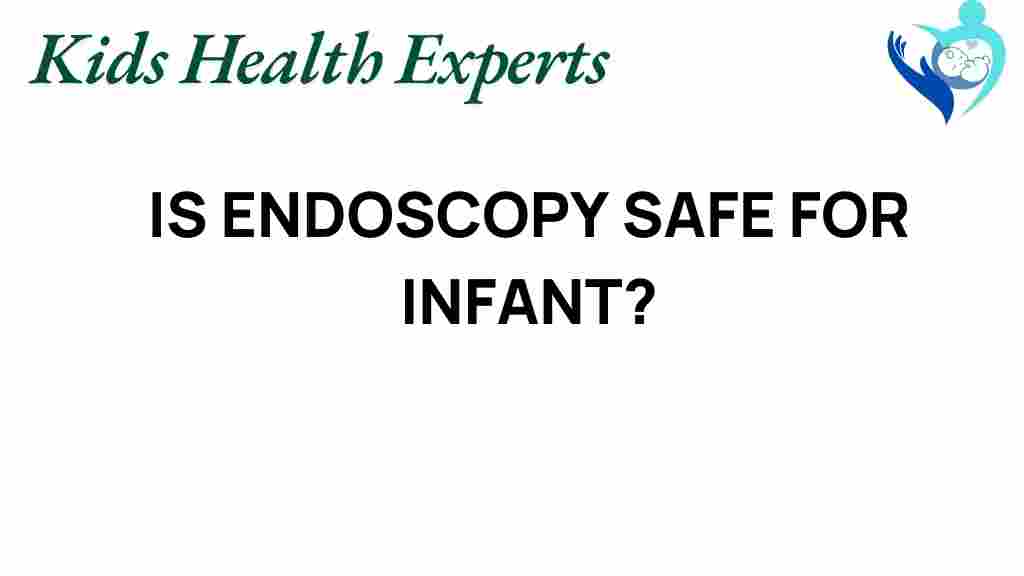Is Endoscopy Safe for Infants? Understanding the Safety of Endoscopy Procedures for Infants
Endoscopy is a medical procedure that allows healthcare professionals to examine the interior of a patient’s body using a flexible tube with a light and camera. While often used in adults for gastrointestinal issues, many parents wonder about the safety and implications of endoscopy for infants. This article will unpack the risks and benefits of endoscopy in infants, providing valuable insights for parents considering this medical procedure for their child.
Understanding Endoscopy in Infants
Endoscopy is commonly performed to diagnose and sometimes treat gastrointestinal (GI) issues. For infants, it can be necessary when symptoms such as vomiting, abdominal pain, or failure to thrive occur. It’s crucial for parents to understand how this procedure works, its safety, and the potential health risks involved.
When is Endoscopy Recommended for Infants?
Healthcare providers may recommend endoscopy in infants for various reasons, including:
- Persistent gastrointestinal symptoms: Symptoms that do not improve with standard treatments may require an endoscopic examination.
- Unexplained weight loss or failure to thrive: To determine underlying causes that may not be visible through other diagnostic methods.
- Suspected intestinal blockage: Endoscopy can help visualize and sometimes treat blockages.
- Evaluation of chronic diarrhea: To investigate potential infections or inflammatory conditions in the GI tract.
Assessing the Safety of Endoscopy for Infants
The safety of endoscopy in infants is a concern for many parents. The procedure is generally considered safe when performed by experienced pediatric gastroenterologists. Here are some key points regarding safety:
Risks Associated with Endoscopy
Like any medical procedure, endoscopy comes with potential risks. These risks may include:
- Bleeding: Although rare, bleeding can occur at the site of biopsy or if a polyp is removed.
- Perforation: A tear in the lining of the GI tract, while very uncommon, is a serious complication.
- Infection: There is a small risk of infection, particularly if the procedure involves taking biopsies.
- Anesthesia risks: Infants require sedation for the procedure, which carries its own set of risks, particularly in very young or ill infants.
Benefits of Endoscopy for Infants
While there are risks, the benefits of endoscopy can outweigh them, especially when it comes to accurate diagnosis and treatment. Some benefits include:
- Accurate diagnosis: Endoscopy allows for direct visualization, leading to better diagnosis of conditions like gastroesophageal reflux, celiac disease, or intestinal malrotation.
- Minimally invasive: Compared to open surgery, endoscopy is less invasive, typically leading to shorter recovery times.
- Therapeutic interventions: In some cases, endoscopy can be used to treat conditions, such as removing foreign objects or polyps.
Preparation for Endoscopy in Infants
Proper preparation is crucial for a successful endoscopy. Here’s a step-by-step guide for parents:
- Consultation: Discuss your child’s symptoms with a pediatric gastroenterologist who can determine if endoscopy is necessary.
- Pre-procedure instructions: Follow all instructions regarding fasting and medications, which are essential for safety during the procedure.
- Discuss anesthesia: Understand the type of anesthesia that will be used and discuss any concerns with the anesthesiologist.
- Comfort your child: Prepare your infant by keeping them calm and comfortable. Bring a favorite toy or blanket.
Post-Procedure Care for Infants
After the endoscopy, monitoring is essential. Here’s what parents should expect:
- Recovery time: Infants may be groggy from anesthesia and will need time to recover before going home.
- Watch for complications: Be vigilant for signs of bleeding, severe abdominal pain, or fever, and contact your healthcare provider if they occur.
- Dietary changes: Adhere to any dietary recommendations provided by the gastroenterologist.
Common Concerns and Troubleshooting
Parents may have various concerns about the endoscopy procedure. Here are some common questions and troubleshooting tips:
What if my infant is ill before the procedure?
If your infant has a cold, fever, or any illness, inform the healthcare provider immediately. They may reschedule the procedure to ensure your child’s safety.
How will I know if my infant is okay after the procedure?
Healthcare providers will monitor your child for a few hours post-procedure. Look for:
- Normal breathing and alertness.
- No excessive crying or signs of pain.
- Normal bowel movements in the days following the procedure.
What are the signs of complications I should watch for?
Parents should be aware of symptoms that may indicate complications:
- Unusual irritability or inconsolable crying.
- Persistent vomiting or inability to keep fluids down.
- Fever over 101°F (38.3°C).
- Visible blood in stool or vomit.
If any of these symptoms occur, contact your healthcare provider immediately.
Conclusion: Making Informed Choices About Endoscopy for Infants
In conclusion, while endoscopy is generally safe for infants when conducted by qualified healthcare professionals, it is essential for parents to weigh the risks and benefits. Understanding the procedure, preparing adequately, and monitoring your infant post-operation can help alleviate concerns. If you have more questions or need guidance, consult with your pediatric healthcare provider.
For more information on pediatric care and specific health risks associated with endoscopy, visit this resource. Additionally, check out our other articles on child health topics to stay informed.
This article is in the category Care and created by KidsHealthExperts Team
